GwinnettForum | Number 19.96 | March 17. 2020
AIMING FOR A HIGHER STANDARD Here’s a concept of an ambitious Gwinnett Water Department program that aims at setting a new standard for water….throughout the world. Note the iconic water tower at the entrance of what will be The Water Tower campus adjacent to the Hill Water Reclamation Plant and the Environmental and Heritage Center, off Puckett’s Road in the Buford area. For more details, see Elliott Brack’s perspective below.
 TODAY’S FOCUS: Saving the Georgia Coast Looks at History and Speaks to Today
TODAY’S FOCUS: Saving the Georgia Coast Looks at History and Speaks to Today
EEB PERSPECTIVE: Gwinnett Readies To Set New World Standard for Water Technology
ANOTHER VIEW: In Our Current Crisis, Why, Yes Indeed, We Talk to Strangers
SPOTLIGHT: Walton Gas
FEEDBACK: Wants Clarification on Conservatives term of “Limited Government”
UPCOMING: Community Foundation Announces Plans for Coronavirus Relief
NOTABLE: SPLOST Pays for New Fire Engines, Costing $642,147 Each
RECOMMENDED: The Book with No Pictures by B.J. Novak
GEORGIA TIDBIT: Milton County, Broke During Depression, Absorbed by Fulton County
MYSTERY PHOTO: Off-the-beaten Path Photo is Today’s Mystery Picture
Saving the Georgia Coast looks at history, speaks to today
(Editor’s note: A new book, “Saving the Georgia Coast,” comes from today’s author. It is being published by the University of Georgia Press and is available at Indieboundbooks.org and local book stores—eeb).
By Paul Bolster
BRUNSWICK, Ga. | Once I had a little rental house on Tybee Island. I loved being there whenever possible, and enjoyed the beach. What I really loved was taking my small REI kayak, slipping across the tidal river through Jack’s Cut over to little Tybee Island. Much larger than urbanized Tybee, most of Little Tybee is marsh grass and small hammocks.
On either side of high or low tide, you will find a narrow stream that gets you into the wide expanse of marsh on the back side of the slim barrier island. It’s narrow, but has a mile-long natural sandy beach.
No structures are on the island–homes, docks, campgrounds, or picnic tables. When I stretched out on the beach one October day there was not another soul in sight and I felt like a lone visitor to a South Pacific atoll.
The book came from basic curiosity. Why was this beautiful island and its marshland here for me to freely explore? I learned it was free and natural not by accident but through struggle and visionary legislation.
Two other parts of my life told me I could write the book from a unique perspective. Some years ago I learned to research and write academic history (I have a PhD from UGA in history) and thought it time to put all that learning to work. More importantly I wanted people to know what legislators do and how they work to make the state’s laws. I spent 12 years doing this work as a member of the Georgia House of Representatives. Reid Harris, the star of the book, spent six years in the House and left us a narrative of his struggles to protect the coast.
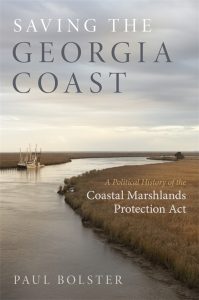 Georgia has 100 miles of coast and only a small part is developed. The two pockets of development (east of Savannah and east of Brunswick) cover maybe less than ten miles of the coast leaving the rest undeveloped by modern standards. Only four of the fourteen barrier islands (Tybee, Sea Island, St. Simons, and Jekyll) are reachable by car. The coast is preserved because courageous Georgia leaders passed the Coastal Marshlands Protection Act in 1970. Georgia led the nation in protecting the value of its marshlands.
Georgia has 100 miles of coast and only a small part is developed. The two pockets of development (east of Savannah and east of Brunswick) cover maybe less than ten miles of the coast leaving the rest undeveloped by modern standards. Only four of the fourteen barrier islands (Tybee, Sea Island, St. Simons, and Jekyll) are reachable by car. The coast is preserved because courageous Georgia leaders passed the Coastal Marshlands Protection Act in 1970. Georgia led the nation in protecting the value of its marshlands.
This book brings to life the political climate of the state between 1968 and 1970 and introduces the characters who made the decisions: Tall, lean and intellectual Reid Harris, the representative from Brunswick; elegant and passionate Jane Yarn, who charmed legislators and organized volunteers to produce a massive letter writing campaign; and former Game and Fish Commissioner George Bagby, who advised Lester Maddox into a new role as an environmental governor. Many more individuals and fledgling environmental organizations played essential roles in forming the bipartisan coalition supporting the bill.
The book points to the coastal challenges today and the more than 25 organizations that seek to protect the future of the islands and marshlands. The rising sea may force the marshes and even the islands to migrate while more people want the opportunity to live at the edge of the sea. Legislators will make decisions affecting the future of the coast and voters will need to make sure they are well informed.
Some will need to be courageous as in the past.
- Have a comment? Send to: elliott@brack.net
Gwinnett to set new world standard for water technology
By Elliott Brack
Editor and Publisher, GwinnettForum
MARCH 17, 2020 | Even before Gwinnett’s F. Wayne Hill Water Reclamation Plant was finished, it attracted water professionals worldwide to visit the plant. Gwinnett was aiming to treat sewage at a higher standard than anyone in the world, plus returning treated water to Lake Lanier at a higher quality than when the water came from the lake.
 Now Gwinnett’s Water Department is seeking to duplicate for clean water what it did for wastewater. On Tuesday the County Commission will award a contract for The Water Tower, the first (of four) planned buildings, on land adjacent to the Hill Plant, to set a new standard for water utilities worldwide.
Now Gwinnett’s Water Department is seeking to duplicate for clean water what it did for wastewater. On Tuesday the County Commission will award a contract for The Water Tower, the first (of four) planned buildings, on land adjacent to the Hill Plant, to set a new standard for water utilities worldwide.
In September, 2019, Gwinnett’s Water Department came up with the concept for an innovation center for the study of challenges facing water utilities worldwide. It estimated that it would cost $60 million to do so. And it hired an expert in the field, Melissa Meeker, who had been chief executive officer of The Water Environment and Reuse Foundation in Washington, D.C.
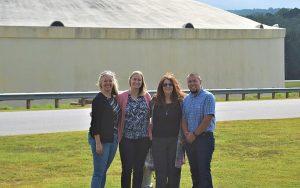
From left are the four Water Tower employees: Melissa Meeker, CEO; Kristan VandenHeuvel, strategic director of Research and Engagement; Peggy Alexander, office manager; and Chad Wilbanks, strategic director of Training and Demonstrations.
She also served as executive director of the South Florida Water Management District and deputy secretary of the Florida Department of Environmental Protection, with responsibility for overseeing statewide water and environmental restoration policy, including Everglades restoration. Meeker is a Florida native and has a BS in Biology and a MS in Environmental Resource Management.
Once in Gwinnett, Meeker started asking questions about the idea she had been hired to do….and found little had been done. Her newly-assembled team produced a Business Plan. Lo and behold, what had been estimated to cost $60 million, they found could be done for an estimated under $30 million. So, from the start, she’s already paid for herself! The project anticipates it will be self-sustaining, not costing Gwinnett water customers.
Tyler Richards, head of the Gwinnett Water Department, said of attracting Meeker to Gwinnett: “Once Melissa visited Gwinnett County, heard about the mission and value of the Water Tower and saw the incredible interest and support from the County, the business community and educational institutions, she was fully on-board and we attracted her.”
Here are the four components of the plan:
- Applied Research: Real world application and test conditions in a world class facility, with strategic and collaborative partnerships.
- Technology Innovation: Establish a model for technology demonstration in real time using actual process flows to vet performance of innovated equipment and processes.
- Workforce Development: In-the-field speciality water industry training to develop a career pipeline through recruitment, using internships and apprenticeships.
- Community Engagement: Become a beacon and forum for the public to connect and understand the value of water, through outreach events, securing funding for priorities and networking opportunities.
Already, engineering firms, water utilities and other companies connected with water in any way are joining in public-private partnerships to see The Water Tower succeed. Meeker adds: “We want to make this a research and training ground for innovation in all sorts of ways. Technical firms can use our plant for research and real-time demonstration and evaluation of their new equipment.”
Part of the goal of The Water Tower is to train students in internships so that they can step into good paying jobs in the industry at all levels, something technical firms and colleges will employ at the facility. Meeker says: “We want to offer space for working from the GED level to the PhD.”
Chairman Charlotte Nash says of the project: “The Water Tower at Gwinnett has the potential to change the future of water use not just in Gwinnett, but around the globe. The Water Tower will be a unique combination of policy forum, research facilities, business incubator, and public education venue, all focused on water management. One of the strengths of the Water Tower’s approach is that it will bring together policy makers, academic leaders, practitioners, business, and the general public to address the critical issue of ensuring clean water for the future.”
“The Gwinnett standard,” as Chairman Nash stressed in her State of the County speech, is adding a new dimension, this time in the world, in the production of safe water.
- Have a comment? Send to: elliott@brack.net
In our current crisis, why, yes indeed, we talk to strangers
By Debra Houston, contributing columnist
LILBURN, Ga. | I brace myself for a routine follow-up with my pulmonary specialist. I’d had a sinus infection that had spread to my lungs. Twice in my life I’ve nearly died from asthma. So I take my pulmonary condition seriously. COVID-19 would too find my lungs.
![]() I contemplate the maneuvers required to avoid the virus based on CDC recommendations. Clean your hands often, don’t touch your eyes, nose, or mouth, and stay away from the sick. Before I leave home, I drop a pack of antiseptic wipes and hand sanitizer into my purse.
I contemplate the maneuvers required to avoid the virus based on CDC recommendations. Clean your hands often, don’t touch your eyes, nose, or mouth, and stay away from the sick. Before I leave home, I drop a pack of antiseptic wipes and hand sanitizer into my purse.
When I arrive, I wonder if I should clean the elevator buttons with my wipes. I decide no. The elevator rises to the third floor and I step out. The doctor’s office is on my right. I open what I hope isn’t a dirty door and enter a room filled with sick people. I sign in with a pen they’d used. I sit away from them, open my purse, and squeeze dollops of hand sanitizer into my palms. Usually I browse through magazines while I wait, but what if a patient had moistened a finger to flip the pages?
I’m called inside and my specialist gently shakes my hand. My lungs are good. I ask him to prescribe a three-month supply of inhalers to cover me in case pharmacy supplies run out. Back in my car, I spread on the hand sanitizer again. I feel low because once again America must adapt to a “new normal.”
Then, on March 12, Governor Kemp encouraged state school districts to close. Later that afternoon, he reappeared, sharing what was keeping him awake at night the most: Georgia doesn’t have enough hospital beds if the Coronavirus hits the state hard. When a leader is that candid, you need to take heed.
Unbeknownst to him, his comments spurred supermarket runs. At first I thought Gwinnettians hadn’t grasped the gravity of the COVID-19 threat. I based that on what I’d witnessed at Ingles that night. Shoppers were talking to one another. Total strangers spoke to me as if I were family. We were sharing our grim circumstances and offering information. I said I hadn’t heard whether or not Gwinnett County schools were closing. “Oh, yes, they are,” a mom said. “My kids were really happy to hear that.”
There was no shoving or fighting over the last roll of toilet paper. Nobody rammed into the cart I’d sanitized, but two came close and promptly apologized. There were long checkout lines but nobody complained. Even the cashier was upbeat, although her husband didn’t know where she was since Ingles had called her in. “I rushed out of the house.” I smiled and thanked her. People were mostly buying bread, eggs, chips, and frozen mac and cheese. Not much remained on the shelves.
What I believe now is that those shoppers were a microcosm of Georgians. They indeed understood the seriousness of America’s new threat but remembered other threats and crises they’d gone through in the past. Americans face trouble head-on. In a weird way, those shoppers lifted my spirits. I took real heart in the indomitable spirit of the people from my hometown.
It made me think of a Georgia governor who once asked the people of his state to limit water usage or else suffer through a water shortage. When that crisis passed, Governor Perdue said we’d exceeded his expectations. Governor Kemp has now asked us to help our neighbors through this crisis . Watch us, Governor. — We talk to strangers.
- Have a comment? Send to: elliott@brack.net
Walton Gas
 The public spiritedness of our sponsors allows us to bring GwinnettForum.com to you at no cost to readers. Walton Gas is a Georgia Proud hometown company that serves the natural gas needs of many Gwinnett citizens. Anyone on the Atlanta Gas Light natural gas pipes system is eligible for service – you do not have to get electricity from Walton EMC to be our customer! Be sure to visit us at many local events including Suwanee Fest, Snellville Live on the Lawn and the Snellville Fall Festival. To get Walton GAS competitively gas rate, call 770-GAS-HEAT.
The public spiritedness of our sponsors allows us to bring GwinnettForum.com to you at no cost to readers. Walton Gas is a Georgia Proud hometown company that serves the natural gas needs of many Gwinnett citizens. Anyone on the Atlanta Gas Light natural gas pipes system is eligible for service – you do not have to get electricity from Walton EMC to be our customer! Be sure to visit us at many local events including Suwanee Fest, Snellville Live on the Lawn and the Snellville Fall Festival. To get Walton GAS competitively gas rate, call 770-GAS-HEAT.
- Contact Walton EMC at waltonemc.com, facebook.com/waltonemc or 770-267-2505.
- For a list of other sponsors of this forum, click here.
Wants clarification on use of of “limited government”
Editor, the Forum:
![]() What do conservatives mean by “limited government?”
What do conservatives mean by “limited government?”
Gregg Stopher’s letter of March 15, 2020, lists several beliefs he asserts that conservatives hold. He leads his list with “Conservatives simply believe in limited government…” I have a question for Mr. Stopher, since all government is limited by its nature, what exactly do conservatives think constitutes limited government?
He gives us a clue in his assertion that America’s founders did not intend for the “federal government to encroach on every part of our daily lives.” While I agree with that statement, I must say that I do not see such encroachment on every part of our daily lives.
Perhaps Mr. Stopher will clarify his statements with some specific examples of the unintended governmental encroachment he believes exists and avoid the hyperbole he used in his letter.
— Michael Wood, Peachtree Corners
Election officials may have to prepare another ballot
Editor, the Forum:
I have a concern about our Presidential Primary elections being postponed until May. My concern is this: I voted early for president (the list for Democrats is long) and made my choice. I was in and out very quickly, because I didn’t have to make any other decisions for any other office.
Now Governor Brian Kemp has decided to suspend the March 24 primary and combine it with the May 19 state primary election. What’s going to happen to my presidential primary vote and how will it affect my upcoming ballot for the other offices?
Now my suspicious mind goes to a dark place concerning voter suppression or voter fraud on the side of our government. Do you know how the election board is going to handle this situation?
Do you think my early primary vote will be voided? Again, voter fraud/suppression comes to mind, especially from this current state administration. Personally, I think the March 24 vote should go on as scheduled. People will or won’t come out to vote regardless of any situation.
— Sara Rawlins, Lawrenceville
Dear Sara: You raise an interesting question. It may mean that each county will have to have even another ballot, this ballot not giving you a chance to vote again for your choice for president, while giving those of us who did not vote an additional choice to make for both president and the primary candidates. Somewhat complicates the election process, yet gives all a ballot in both primaries.—eeb
Send us your thoughts: We encourage you to send us your letters and thoughts on issues raised in GwinnettForum. Please limit comments to 300 words. We reserve the right to edit for clarity and length. Send feedback and letters to: elliott@brack.net
Community Foundation has plans for coronavirus relief
 The Community Foundation for Northeast Georgia announced on March 13 that they created the Coronavirus Relief Fund in response to the COVID-19 pandemic.
The Community Foundation for Northeast Georgia announced on March 13 that they created the Coronavirus Relief Fund in response to the COVID-19 pandemic.
Below is their official statement:
While these may be uncertain times, one thing we know for sure is that our nonprofits serving those in need will need our help now more than ever. From food co-ops and those providing shelter to organizations helping make sure kids at home have food and needed healthcare is available – and more – this is a critical time. Quarantines help limit the spread of the virus but they also put more burdens on our nonprofits.
During this unprecedented time in our nation, it is not a time to shrink back from helping those around us. HOW we help will look a little different, though, and that’s where we have taken initiative by establishing the Coronavirus Relief Fund.
Here at the Community Foundation, we are part of the crucial community conversations happening around our nonprofits. We are sitting in the meetings, participating in the conference calls, and we are seeing firsthand where money can be best invested during this critical time in order to make an accelerated difference in the community. That’s why we created the Coronavirus Relief Fund.
ANYONE can give to the Coronavirus Relief Fund and the money from the fund will be distributed to nonprofits meeting critical needs. Giving to the fund allows donors to know that the money they give will be strategically distributed to meet the most pressing needs as they unfold.
- Donations can be made at cfneg.org.
SPLOST pays for new fire engines, costing $642,147 each
Gwinnett commissioners have approved about $2.6 million in 2017 SPLOST program funds to buy four new fire engines over two years. The engines, known as triple combination rescue-style pumpers, from Sutphen Corporation will cost $642,147 each.
Fire Chief Russell Knick said, “As our population grows, so do the risks of fire, vehicle accidents and other emergencies. These new fire engines will help assure a prompt, reliable response to the needs of Gwinnett residents.”
With a staff of 1,008 employees, Gwinnett Fire and Emergency Services responds to more than 84,000 calls annually with 31 engine companies, 12 ladder trucks, and 31 ambulances. EMTs and paramedics staff all emergency response vehicles and carry essential medical equipment for advanced life support. The department also provides trained teams for technical rescue, hazardous materials and swift water rescue situations.
The Book with No Pictures, by B.J. Novak
![]() From Karen Harris, Stone Mountain: A book with no pictures may seem like a strange idea. There is nothing to look at but the words on the page. The thing is the reader has to read the words out loud even if they are strange and funny! B. J Novak’s The Book with No Pictures is an ingenious way to get children and adults to read even funny, strange words with abandon and joy! Some of the words are laugh-out-loud funny and absolutely delightful. A book to enjoy on one’s own or with a little person or a group to loosen up the fun muscles and enjoy the moment!
From Karen Harris, Stone Mountain: A book with no pictures may seem like a strange idea. There is nothing to look at but the words on the page. The thing is the reader has to read the words out loud even if they are strange and funny! B. J Novak’s The Book with No Pictures is an ingenious way to get children and adults to read even funny, strange words with abandon and joy! Some of the words are laugh-out-loud funny and absolutely delightful. A book to enjoy on one’s own or with a little person or a group to loosen up the fun muscles and enjoy the moment!
An invitation: what books, restaurants, movies or web sites have you enjoyed recently? Send us your recent selection, along with a short paragraph (100 words) as to why you liked this, plus what you plan to visit or read next. Send to: elliott@brack.net
Milton County, broke in Depression, absorbed by Fulton County
Milton County, north of Atlanta, where cotton was king for most of its 75 years of existence, was one of only two Georgia counties in modern times to be abolished (the other was Campbell County, south of Atlanta).
Milton was known for its rich farming land, and residents were known for experimentation with and development of fine-quality cotton with high yields. Its county seat, Alpharetta, was the hub of city and county activities and events. Located 25 miles north of Atlanta, on the south Milton County bordered the town of Roswell, just two miles from the Chattahoochee River, and it was surrounded by Cherokee, Cobb, and Forsyth counties.
The area of Georgia designated as Milton County was originally part of the Cherokee Nation, and Cherokees and early white settlers lived together in relative harmony for a number of years. The state took over the Cherokee lands in 1830, carved them into ten separate counties, distributed them to whites in the 1832 land lottery, and then expelled the remaining native Americans to present-day Oklahoma on the Trail of Tears in 1838-39.
The need for a more accessible county seat led to the creation of Milton County on December 18, 1857, from parts of Cherokee, Forsyth, and Cobb counties. In 1859 small portions of DeKalb and Gwinnett counties were added, with the land from DeKalb transferred to Fulton County in 1929.
Milton County was named for John Milton, Georgia’s first secretary of state, who was elected three times. A lieutenant colonel in the Revolutionary War (1775-83), he is credited with saving and preserving the state’s official records during the British occupation.
Evolving from a Methodist settlement of tents and other temporary housing called New Prospect Campground, the city of Alpharetta was incorporated in 1858 and designated the county seat. The Civil War (1861-65) began less than three years later. Union troops never came closer than the county’s Roswell border.
Milton County had a population of 3,985 in 1860. Agriculture was the main industry and cotton the main crop. Several farmers developed well-known varieties of cotton with prolific yields. Cotton was ginned locally and sold at premium prices to the Roswell Manufacturing Company to be processed in its textile mills.
The Alpharetta Free Press was a widely known and respected newspaper. Many communities dotted the countryside, and some of these—for example, Birmingham, Crabapple, Hopewell, Newtown, Ocee, and Warsaw—remain identifiable today.
Because the county had virtually a one-industry economy supplemented with other agricultural dependencies, the weather could play havoc with income and assets. Eventually, boll weevil infestations of the 1910s and 1920s and the Great Depression of the 1930s left Milton County destitute, with almost no paved roads, dilapidated one- and two-room schools, a dearth of health accommodations, and high taxes.
Milton County, with a population of 6,730 in 1930, merged with Fulton County on January 1, 1932, through an act of the state legislature. The annexation meant lower taxes, an improved economy, the advantages of the Fulton County school system, and county medical offerings for the residents of the former county.
In May 1932 the Roswell Militia District, including the city of Roswell, seceded from Cobb County and also merged with Fulton County. Thus was born what is known unofficially and variously defined today as north Fulton County.
- To view the Georgia Encyclopedia article online, go to http://georgiaencyclopedia.org
Off-the-beaten path photo is today’s Mystery Picture
Today’s Mystery Photo is a little off the beaten path, and may prove difficult for our mystery sleuths. Try to figure out where this photo was taken, then send your answers to elliott@brack.net, to include your hometown.
 The last Mystery Photo drew a quick response. Larry Zani, Kaiserlauten, Germany, told us: “That photo is of the Deutsches Eck at the confluence of the Rhine and Mosel rivers in Germany. The statue depicts Emperor William I and commemorates the unification of Germany in the late 1800’s. The Rhein river side has a lovely park enjoyed by many families and retirees included, and hosts carnivals and other events during the year. On the Mosel side are very much visited biergarten and eiscafe stops for one’s walk along the river.” The photo was sent in by Frank Studer of Greenville, S.C.
The last Mystery Photo drew a quick response. Larry Zani, Kaiserlauten, Germany, told us: “That photo is of the Deutsches Eck at the confluence of the Rhine and Mosel rivers in Germany. The statue depicts Emperor William I and commemorates the unification of Germany in the late 1800’s. The Rhein river side has a lovely park enjoyed by many families and retirees included, and hosts carnivals and other events during the year. On the Mosel side are very much visited biergarten and eiscafe stops for one’s walk along the river.” The photo was sent in by Frank Studer of Greenville, S.C.
Others identifying the photo include Tom Merkel of Berkeley Lake; Virginia Klaer, Duluth; Susan McBrayer, Sugar Hill, who reminded us: “The memorial was constructed in the 1890s but was destroyed just before the end of WWII on March 16, 1945, by an American artillery attack. The remaining pedestal was declared a monument of German unity and in 1993, a replica of the original equestrian statue of Wilhelm was placed on top of it.”
Allan Peel, San Antonio, Tex., sent in a photo “….taken from the nearby Ehrenbreitstein Fortress, which shows an elevated view of the confluence of the two rivers.”
George Graf, Palmyra, Va., remembers: “Our favorite road trip in Germany always began at Koblenz and we would travel down the Moselle River over a few days until we reached Trier on the Luxembourg border. The Moselle was absolutely a beautiful trip down the steep valley littered with gorgeous vineyards and wine tasting locations. Trier was a Roman settlement and has many ruins attesting to that fact. Many visitors to our home in Germany were treated to a Moselle River trip with me as their amateur guide and chauffeur.”
GwinnettForum is provided to you at no charge every Tuesday and Friday.
Meet our team
- Editor and publisher: Elliott Brack, 770-840-1003
- Managing editor: Betsy Brack
- Roving photographer: Frank Sharp
- Contributing columnist: Jack Bernard
- Contributing columnist: Debra Houston
- Contributing columnist: George Wilson
More
- Location: We are located in Suite 225, 40 Technology Park, Peachtree Corners, Ga. 30092.
- Work with us: If you would like to serve as an underwriter, click here to learn more.
Subscriptions to GwinnettForum are free.
- Click to subscribe.
- Unsubscribe. We hope you’ll keep receiving the great news and information from GwinnettForum, but if you need to unsubscribe, go to this page and unsubscribe in the appropriate box.
© 2020, Gwinnett Forum.com. Gwinnett Forum is an online community commentary for exploring pragmatic and sensible social, political and economic approaches to improve life in Gwinnett County, Ga. USA.


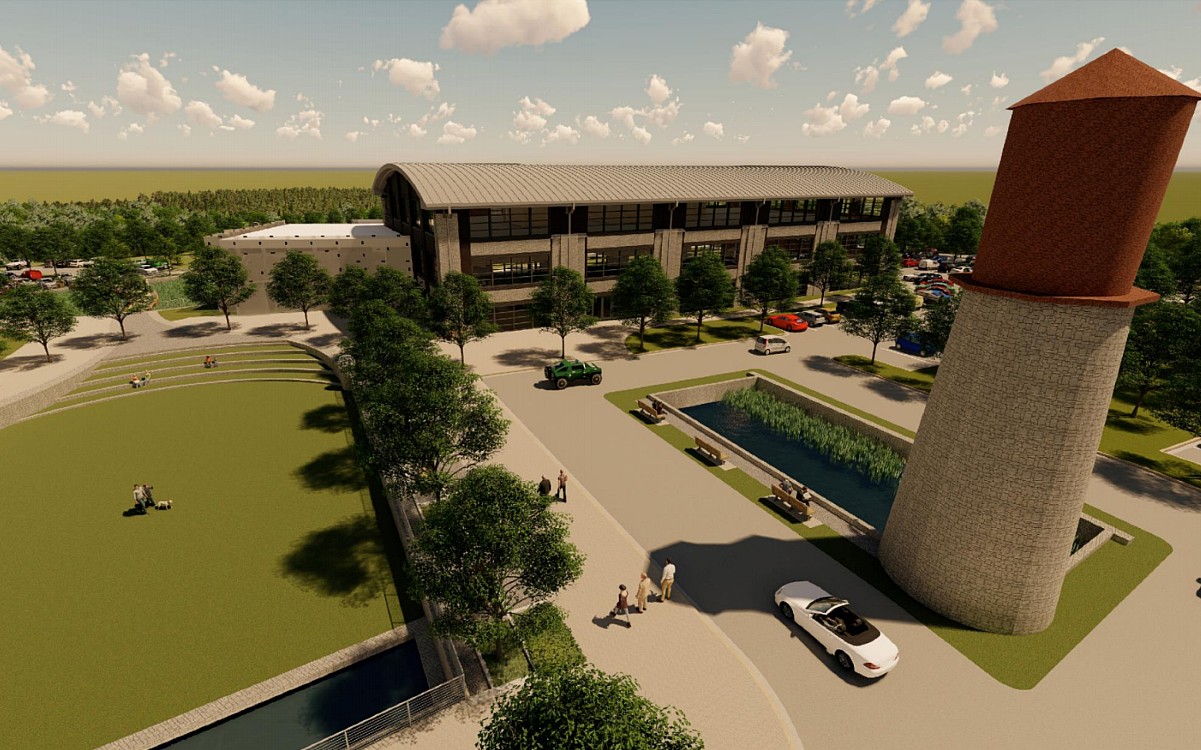


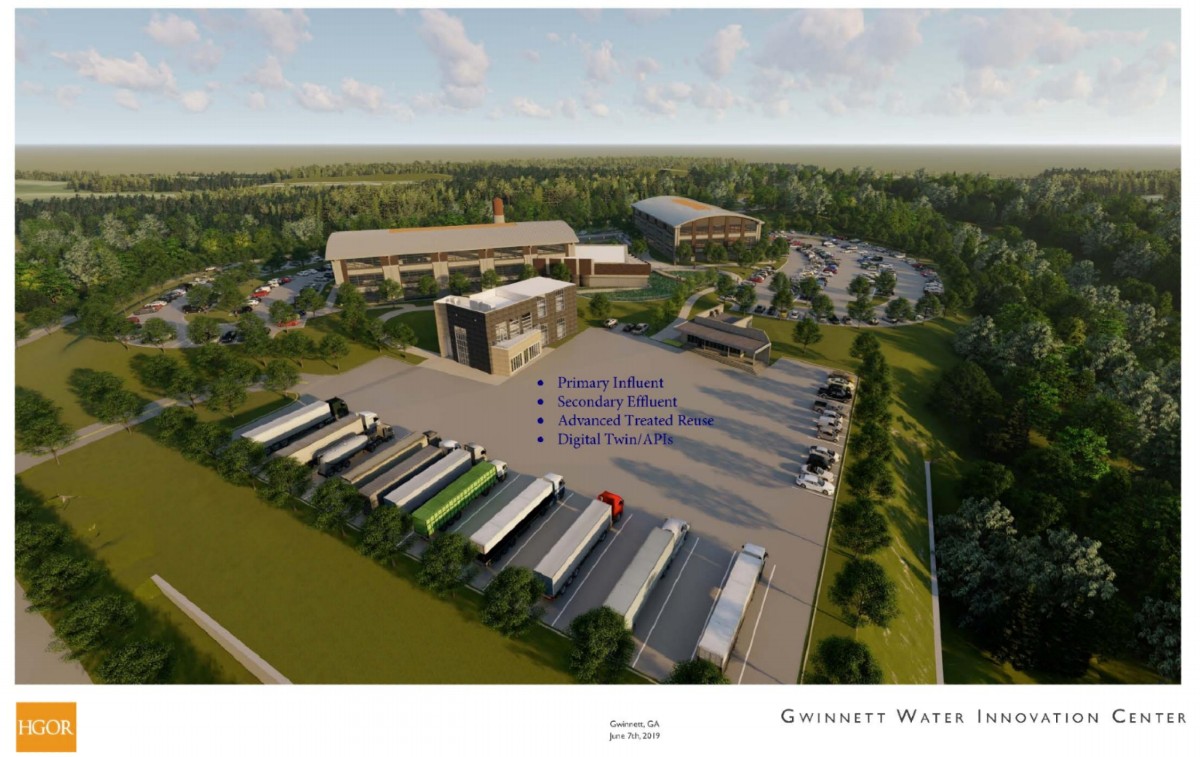

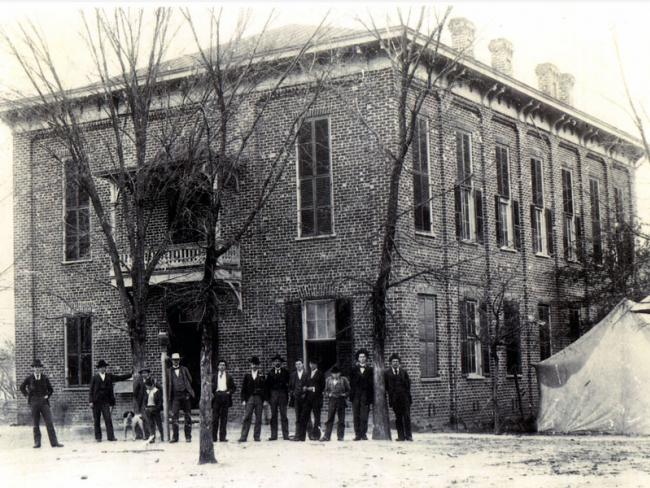
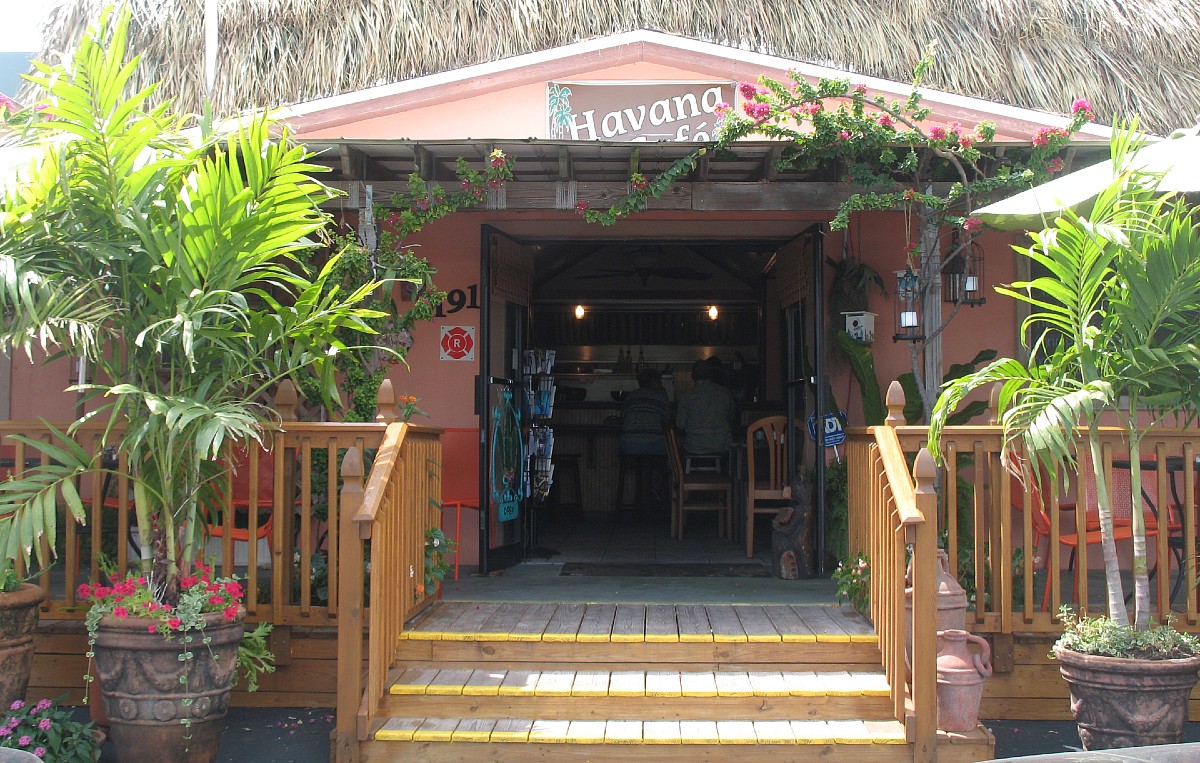
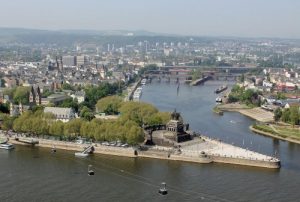







Follow Us